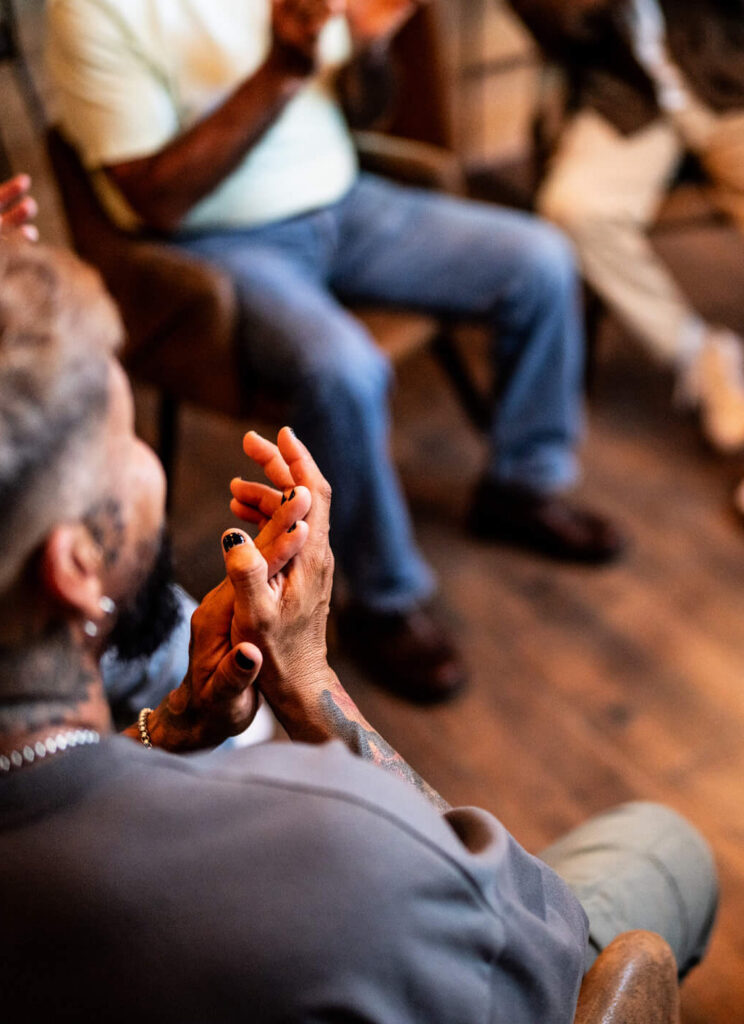Toolkit for people who have been impacted by a suicide attempt
The Mental Health Commission of Canada, in collaboration with the Canadian Association for Suicide Prevention, the Canadian Mental Health Association, Alberta Division (CMHA Alberta) and Centre for Suicide Prevention, the Public Health Agency of Canada, along with an Advisory Committee comprised of people with lived experience related to suicide, have developed toolkits to support people who have been impacted by suicide. This toolkit focuses on resources for people who have been impacted by a suicide attempt; a companion toolkit is tailored for people who have lost someone to suicide.
The content of the toolkits is informed by an online survey we did in the summer of 2017 to gather feedback from people affected by suicide. There were over 1,000 responses, and the feedback helped us develop a better understanding of what topics, content areas, resources, and information were important to include in the toolkits. The toolkits also include resources highlighted in a literature review done by the CMHA Alberta and Centre for Suicide Prevention. Both toolkits were refreshed in 2025 to reflect updated resources.
Please note that the toolkits are not an exhaustive list of the wide variety of resources available across Canada for support. If you are not finding the tools and resources that resonate most with you, you may wish to connect with a trained responder by contacting 988.

Introduction

The Content
There is no right or wrong way to seek help. This toolkit is not designed to be an exhaustive list of the very wide variety of resources available across Canada for support. It is intended to be a summary of the tools that have resonated most with the hundreds of people who completed an online survey we conducted and of resources from a literature review completed by the Canadian Mental Health Association, Alberta Division (CMHA Alberta) and Centre for Suicide Prevention.
If you are not finding the tools and resources that resonate most with you, you may consider talking with someone. You may wish to connect with a trained responder by contacting 988 or Kids Help Phone.
What it is
This toolkit focuses on resources for people who have been impacted by a suicide attempt; a companion toolkit is tailored for people who have lost someone to suicide.
The content of the toolkits is informed by an online survey we did in the summer of 2017 to gather feedback from people affected by suicide. There were over 1,000 responses, and the feedback helped us develop a better understanding of what topics, content areas, resources, and information were important to include in the toolkits. The toolkits also include resources highlighted in a literature review done by the CMHA Alberta and Centre for Suicide Prevention. Both toolkits were refreshed in 2025 to reflect updated resources.
Language
Survey respondents indicated a preference for “people-first” language. You may consider yourself to be someone who has survived a suicide attempt, or you may identify yourself as a survivor of a suicide attempt. How you identify yourself is a personal decision.Strategies and coping suggestions
There is no single way or “right” way to cope with thoughts of suicide. People will experience thoughts of suicide differently, and therefore the ways of coping with these thoughts will be different for every individual.
Below is a non-exhaustive list of strategies that you can use to cope with thoughts of suicide. If you are not finding the tools and resources that resonate most with you, you could try talking about your options with a trained responder by contacting 988.
How to cope with thoughts of suicide and how to get help
- For people experiencing thoughts of suicide, and for the people who care about them, Speaking of suicide is a resource that addresses the fear of stigma, the shame, and the self-blame associated with having thoughts of suicide. It also discusses things people can do when those thoughts emerge.

How to communicate feelings of suicide and thoughts of suicide
- How to tell someone you are thinking about suicide offers advice on talking about thoughts of suicide and ways to keep safe, and it also includes resources in which people with lived experience talk about depression, anxiety, and suicidality. (Note that this is a US-based resource, and the crisis support numbers are not the same as they are in Canada. In Canada, call or text 988 for crisis support.)
- California State University in Sacramento has developed a script between a client and therapist that shows how to communicate thoughts of suicide.
- What it’s like going to the emergency room for suicidal thoughts is a blog by Alyse Ruriani describing one person’s experience of having thoughts of suicide in the emergency department.

Coping strategies
- Coping with Suicidal Thoughts by Joti Samra and Dan Bilsker addresses how to cope with thoughts of suicide and other means of keeping yourself safe.
- How I can cope with thoughts of suicide by Kids Help Phone facilitates the conversation around reaching out for help.
- After an Attempt: A Guide for Taking Care of Yourself After Your Treatment in the Emergency Room by the Substance Abuse and Mental Health Services Administration offers coping strategies and advice for attempt survivors who have been discharged from an emergency department or in-patient hospital ward.
- Coping after a suicide attempt is a guide by Mind for people who have been impacted by a suicide attempt.
Stories from people with lived experience
These websites and books feature the voices of people who have attempted suicide:
- Live through this is a collection of stories of suicide attempt survivors, as told by those survivors.
- Reasons to go on living is an inspiring collection of stories of people who have attempted or seriously thought about dying by suicide.
- Our side of suicide provides survivor stories of people who have attempted suicide.
- Cracked, Not Broken: Surviving and Thriving After a Suicide Attempt (2014) is Kevin Hines’ story of surviving a suicide attempt after jumping off the Golden Gate Bridge and his inspiring work in suicide prevention and advocacy in recovery.
- Hello I Want to Die Please Fix Me: Depression in the First Person (2019) is Anna Paperny’s memoir of her experiences with depression.
- What It Takes to Make It Through: Stories of Suicide Resilience and Loss (2021) is an anthology published by the ARS Suicide & Depression Studies Program at St. Michael’s Hospital in Toronto of the inspiring stories of people who have persevered after an attempted suicide.

Peer support groups
Peer support can be an invaluable source of strength for people who have been impacted by a suicide attempt. Peers can provide emotional support that helps address suicide risk as they share their own experience of recovery, thereby fostering perceived connectedness and reducing feelings of hopelessness among those receiving support — two key factors that protect against suicidal ideation.1

- Peer Support Canada serves as the national voice for peer support.
- Peer support in suicide prevention by the Canadian Mental Health Association, Alberta Division (CMHA Alberta) and Centre for Suicide Prevention discusses the role of peer support in preventing suicide.
- Skills for Safer Living is an intervention group co-facilitated by peers with lived experience for people experiencing suicide-related behaviours. Graduates of this multi-week skills group can then participate in a voluntary ongoing peer support group in some locations. If you’re interested in this program, use a search engine to search for “Skills for Safer Living” and your province or territory name.
Counselling and therapy
Finding the right counsellor may take time. It may also take time to find the therapy and therapist that best suit you. As a starting point, you may want to start a conversation with your family physician. Your doctor may be able to discuss with you whether you require medication in the short term and may also be able to recommend a good counsellor for you. Give yourself the time and permission to look for a therapist whom you feel hears you, understands you, believes you, and provides a type of therapy that works well for you.- Finding the right psychologist can be difficult. On its web page Finding the Psychologist For You, the Canadian Psychological Association maintains a list of all the provincial and territorial associations of psychology.
- You may find a good counsellor or therapist using the Find a Therapist directory provided by Psychology Today.
- Other resources for finding counselling include the following:
- Inclusive Therapists maintains a searchable database of therapists.
- Healing in Colour envisions a world where Black, Indigenous, and people of colour, in all intersections, have access to therapy that supports healing and liberation.
- The Affordable Therapy Network is a directory of therapists offering low-cost and sliding-scale counselling across Canada.

In the same way that not all therapists will be a good fit for everyone, not all types of therapy will suit everyone well. Counsellors may use cognitive behavioural therapy (CBT), dialectical behaviour therapy (DBT), narrative therapy, motivational interviewing, and other techniques, depending on your needs. You can learn about different types of therapy techniques here.
Crisis lines and safety planning
When you are dealing with suicidal thoughts or the aftermath of a suicide attempt, situations can arise that may increase your level of distress. Don’t expect to be able to manage this distress on your own — support is available. Keep the following list of resources on your phone or on a piece of paper in your wallet to ensure they are accessible when you need them most. You may also share them with a friend who can remind you of them.
Crisis lines
- 988 Suicide Crisis Helpline: a nation-wide crisis line available to call or text 24/7 (988)
- Kids Help Phone: a 24-hour, bilingual phone, web, and referral service for children and youth (1-800-668-6868)
- Hope for Wellness Helpline: a helpline for Indigenous People (1-855-242-3310)
- Canadian Forces Morale and Welfare Services’ family information line: an information and crisis line for the military community (1-800-866-4546)
- Boots on the Ground: Peer Support for First Responders (1-833-677-2668)
- It Gets Better Canada: a list of crisis lines in Canada for sexual, gender, and racial minorities
Contacting a crisis line
- The 9-8-8 Suicide Crisis Helpline has a web page describing what to expect when you call or text 988.
- The CMHA Alberta and Centre for Suicide Prevention offers advice on how to ask for help if you are having thoughts of suicide.
- Suggested scripts for talking to a helpline:2
- “Hi. I am calling because I need some help. I’m going through some things that are tough and it sometimes feels like I can’t take it
anymore. It’s so bad there are times I think about suicide.” - “Hi. Things are really hard right now. I’m thinking about killing myself.”
- “Hi. I am calling because I need some help. I’m going through some things that are tough and it sometimes feels like I can’t take it
- Suggested scripts for texting a helpline:2
- “I need help. My life is bad right now and I’m thinking about suicide.”
- “I’ve been thinking about killing myself. Can you help me?”
Developing a safety plan
- Safety plans to prevent suicide is a toolkit by the CMHA Alberta and Centre for Suicide Prevention.
- Things to Consider When Creating a Safety Plan is a resource by the National Suicide Prevention Lifeline.
- How to make a suicide safety plan was developed by SuicideLine Victoria (Australia).
- Sunnybrook Health Sciences Centre’s Coping card is a practical tool that can help a person make an action plan to cope effectively with an emotional crisis so that they do not engage in suicidal behaviour.
- Safety Planning Intervention: A Brief Intervention to Mitigate Suicide Risk describes an innovative way to reduce suicide risk.
How to support a loved one who is having thoughts of suicide

How to talk to about suicide in an honest, safe, and age-appropriate way
- Supporting someone after a suicide attempt by SuicideLine Victoria discusses some helpful and unhelpful things to say to someone who has experienced a suicide attempt.
- Suggestions on how to talk to and support someone after a suicide attempt can be found on pages 16-18 of After a Suicide Attempt: A Guide for Family and Friends by the Klinic Community Health Centre and the Canadian Association for Suicide Prevention.
- What should parents do after a child’s suicide attempt? Answering caregivers’ frequently asked questions by the Children’s Hospital of Orange County provides advice for parents from an expert.
- What to do if your loved one has made a suicide attempt by Sunnybrook Health Sciences Centre provides information for family and friends about suicide and support services.
- Sample script on how to talk to someone who may be having thoughts of suicide: “It sounds like things are really hard for you right now. I can’t imagine what you’re going through, but I know things will get better! Let’s text the distress centre to see what resources they might have that could help. I’m so glad you told me how you’re feeling; I’ve been really worried about you! I feel like it’s a good idea to talk to your parents, too. Want me to come with you?”3
Risk of suicidality for family and friends of an attempt survivor or someone who died by suicide
There is always a potential risk that vulnerable family members or friends who have been exposed to a suicide attempt or a death by suicide may develop thoughts of suicide themselves. Suggested readings:- An article entitled “Familial Transmission of Suicidal Behaviour” looks at the effects that exposure to suicidal behaviours can have on family members.4
- “The Continuum of “survivorship”: Definitional Issues in the Aftermath of Suicide” is a paper that looks at the impact that suicide has on survivors.5
Telling your story safely
Telling your story can be scary. Just as every story related to suicide is personal, the decision to tell your story is personal, and the way you decide to tell that story is up to you. Telling your story can bring great strength; however, be careful to tell your story safely, ensuring your safety and the safety of the person(s) learning from you.
“The decision to share one’s lived experience with suicide may feel scary — especially the first time you share it. While the decision to share can be difficult, your experiences do not need to fit into a perfect set of steps or pathway to be meaningful. If you are considering sharing your story, we recommend using this storytelling checklist to help determine how to share your story safely and effectively — for yourself and others.” – 988 Lifeline
Advocacy and finding hope for people who have experienced a suicide attempt
People who have been impacted by suicide, either through a suicide loss or a suicide attempt, may derive a lot of strength and growth from sharing their experience. They can be passionate advocates for suicide prevention and are in a unique position to influence other people’s attitudes about suicide.6

- Guidelines for Telling Your Own Story contains a suite of pertinent resources to help attempt and loss survivors to safely tell their stories, presented by the National Action Alliance for Suicide Prevention.
- The CMHA Alberta and Centre for Suicide Prevention has prepared guidelines for sharing experiences with suicide.
- 988 Suicide & Crisis Lifeline in the United States has created a Storytelling for Suicide Prevention Checklist.
- Sharing your Story Safely is a resource by the MHCC.
- The Way Forward: Pathways to hope, recovery and wellness with insights from lived experience is a resource devoted to advocacy of suicide attempt survivors. It was produced by the National Action Alliance for Suicide Prevention. They urge attempt survivors to get more involved in suicide prevention initiatives and advocacy:
- “to join crisis centers as members of boards of directors, leaders, and staff/volunteers
- to participate in oversight or advising behavioral health systems change
- to review communications campaigns or social marketing endeavors aimed at consumers/individuals who are suicidal
- to act as spokespersons, advocates, or resources for legislative hearings/testimony
- to be partners in the development of research/evaluation for suicide prevention initiatives”7
Hopeful messages
Knowing that you are not alone and being able to share hope can be incredibly healing. This section of the toolkit is intended to be a safe space to read and to share online messages of hope with other people. A tremendous amount of hope flowed from the responses of people with lived experience related to suicide who completed our online survey. A sample of them are provided below.
For people who have thoughts of suicide
In the survey, we asked people, “If you could give one message to other people who have suicidal thoughts or attempts, what would it be?” Here are a few of the messages we received:- “It will get better! One step at a time, one minute at a time — you got this.”
- “Honestly, it won’t always feel this bad and it WILL get better. You are worth it, please keep going.”
- “If you are looking for a sign not to kill yourself, THIS IS IT.”
- “It is temporary. Do what you need to do to cope and get through this. Sleep if you must, cry if you must, just hold on for another day, hour, or minute.”
- “Please reach out for help, you are not alone and YOU MATTER.”
- “Your illness does not define you.”
- “Breathe.”
- “Don’t ever lose hope! Recovery is possible!”
- “Find one thing to wake up for every day whether it’s a pet, a child, spouse, parent, etc.”
- “Find someone you trust who is supportive and reliable and put them on speed dial!”
- “HOPE (Hold On, Pain Ends).”
For people who are supporting someone who has attempted suicide
In the survey, we asked people, “If you could give one message to other people who are supporting someone who has attempted suicide, what would it be?” Here are a few of the messages we received:- “Be patient. Be hopeful. Be there.”
- “Always take the person seriously, listen and ask them what they need to be safe.”
- “Appreciate that it is not an attention seeking act. Their pain is real — do not minimize their thoughts.”
- “Ask them — what is the most helpful thing I can do for you?”
- “Be non-judgmental. Be supportive. Be kind.”
- “Be strong. Look after yourself and never give up fighting for your loved ones.”
- “Do not blame yourself for not seeing the signs.”
- “Get support and talk about it. Supporters need help too and the love and comfort of knowing they are not living this alone.”
- “Don’t forget to take care of yourself too.”
About suicide
For some people, knowing the basic statistics and other important information about suicide can be helpful. This section of the toolkit is designed to remind you that suicide affects everyone and that you are not alone.
Background and context
What is suicide?
Suicide is defined as the act or instance of taking one’s own life voluntarily and intentionally.
Basic statistics on suicide in Canada
Canada tracks suicide by age, sex, and geography. Unlike the United States, Canada does not record ethnicity or method of death.
- The Government of Canada tracks information on suicide, self-harm, and suicide-related behaviours in Canada.
- Statistics Canada provides a breakdown by age and sex.
- The Public Health Agency of Canada has an infographic that provides statistics on the current context of suicide in Canada.
- The CMHA Alberta and Centre for Suicide Prevention has created a resource that provides suicide rates across provinces and territories.
Safe language around suicide
Some of the traditional language around suicide has negative connotations and, as a result, unintentionally perpetuates stigma. Some examples include “committed suicide” (implying criminality), “successful suicide” or “completed suicide” (implying that the suicide attempt was unsuccessful or incomplete before), and “failed suicide attempt” (implying a failure). More neutral, compassionate words should be used when talking about suicide. Here are a few places to find more information:- Words Matter: Learning how to talk about suicide in a hopeful, respectful way has the power to save lives by the Centre for Addiction and Mental Health
- Language Matters: Safe Communication for Suicide Prevention by the Public Health Agency of Canada.

Myths and facts about suicide
Stigma can be perpetuated by misinformation and myths about suicide. Some myths are more embedded in society than others and may be harmful to people who have been affected by suicide. To help distinguish myth from fact, here are some helpful resources:- About suicide by the Government of Canada
- About suicide prevention by the CMHA Alberta and Centre for Suicide Prevention
- Myths and Facts about Suicide by the Centre for Addiction and Mental Health
- Facts about suicide by the Tennessee Suicide Prevention Network
- Suicide Prevention by the MHCC, with links to fact sheets on subjects including bullying, injury prevention, trauma-informed care, older adults, men, agriculture, youth, and rural and remote communities
Helpful literature:
- Myths about Suicide is a book by Thomas Joiner that sharply debunks myths such as “suicide is selfish,” “if people want to die by suicide, we cannot stop them,” and “it’s just a cry for help.” The book shows why he is considered one of the leaders in the study of suicide.
Why do people attempt to die by suicide?
No single cause can explain or predict suicide. Thoughts of suicide or suicide-related behaviours are a result of a combination of personal, social, and cultural factors. These factors differ from person to person over their lifetime.Social determinants of health
- According to Mikkonnen and Raphael in their influential publication Social Determinants of Health: The Canadian Facts, there are 17 determinants that have a greater bearing on an individual’s health than all other factors:9
- Indigenous ancestry
- disability
- early child development
- education
- employment and working conditions
- food insecurity
- geography
- globalization
- health services
- gender
- housing
- immigration
- income and income distribution
- race
- social exclusion
- social safety net
- unemployment and job security
“The Social and Economic Determinants of Suicide in Canadian Provinces” found a distinct correlation between these determinants and suicide, especially the determinants of unemployment and gender.10 Similarly, a 2025 review found 46 studies showing a strong relationship between the social determinants of health and suicide-related outcomes.11

Risk and protective factors
The Suicide Prevention Resource Center defines risk factors and protective factors in a simple and straightforward way: “Risk factors are characteristics that make it more likely that individuals will consider, attempt, or die by suicide. Protective factors are characteristics that make it less likely that individuals will consider, attempt, or die by suicide.”12 Please note that even if a person has protective factors, it does not mean that they will not move on to attempt suicide.
- Risk factors, protective factors, and warning signs by the American Foundation for Suicide Prevention
- Suicide: risks and prevention by the Government of Canada
The role of trauma and childhood experiences
What is trauma?
According to the Centre for Addiction and Mental Health, trauma is “a term used to describe the challenging emotional consequences that living through a distressing event can have for an individual. Traumatic events can be difficult to define because the same event may be more traumatic for some people than for others. However, traumatic events experienced early in life, such as abuse, neglect and disrupted attachment, can often be devastating. Equally challenging can be later life experiences that are out of one’s control, such as a serious accident, being the victim of violence, living through a natural disaster or war, or sudden unexpected loss.”13
Unresolved trauma in childhood and adolescence is linked to an increased risk for suicide ideation. If it is not addressed, it can escalate with age — potentially leading to suicide attempts or death by suicide. Early intervention after trauma is crucial.14,15,16
- Trauma-Informed Care and Suicide fact sheet by the MHCC
- The Link Between Complex Trauma and Suicidal Ideation by the CPTSD Foundation
Additional Resources
Some people find that immersing themselves in training and additional reading can be healing. This section of the toolkit provides some additional tools and other resources to help you gain the knowledge and courage you need to have conversations about suicide.
Training programs for suicide prevention
- Applied Suicide Intervention Skills Training (ASIST) is a two-day interactive workshop in suicide first aid. ASIST teaches participants to recognize when someone may be having thoughts of suicide and work with them to create a plan for their immediate safety. It is offered by LivingWorks and by the CMHA Alberta and Centre for Suicide Prevention in Alberta.
- safeTALK is a 3.5-hour workshop that equips people to be more alert to the signs that someone is thinking of suicide and to be better able to connect them with further help. It is offered by LivingWorks and by the CMHA Alberta and Centre for Suicide Prevention in Alberta.
- Start is an online, skills-based suicide prevention training program that anyone can complete in as little as one hour. It is offered by LivingWorks.
- Mental Health First Aid provides practical knowledge and skills to support a person who may be experiencing a decline in their mental well-being or a mental health or substance use crisis, until professional help is available. It is offered by Opening Minds at the MHCC. Opening Minds also provides workplace mental health training through The Working Mind and mental health and stigma reduction training for educational and student settings through The Inquiring Mind.
- Question Persuade and Refer (QPR)’s mission is to reduce suicidal behaviours and save lives by providing innovative, practical, and proven suicide prevention training. This training is offered by the QPR Institute.
- Self-harm and Suicide Prevention Training provides high-quality, effective, evidence-based self-harm and suicide prevention training supported by a wealth of research, experience, and expertise. It is offered by Storm Skills Training.
Mobile apps
- Mobile apps can help you to cope following a suicide attempt or can provide other mental health support. The Assessment Framework for Mental Health Apps by the MHCC is a national framework outlining key criteria for safe, quality, and effective mental health apps in Canada. This framework helps identify which apps meet the national criteria and will feature them online in the future.
Other reading
Books- Heckler, R. (2014). Waking up, alive: The descent, The suicide attempt… and the return to life. Ballantine Books.
- Michel, K., & Gysin-Maillart, A. (2015). ASSIP Attempted Suicide Short Intervention Program: A manual for clinicians. Hogrefe Publishing.
- Brickhouse, J. (2016, May 30). Overcoming the shame of a suicide attempt. New York Times. https://archive.nytimes.com/well.blogs.nytimes.com/2016/05/30/overcoming-the-shame-of-a-suicide-attempt/
- Canadian Mental Health Association, Alberta Division and Centre for Suicide Prevention. (2016). Suicide attempt survivors and the value of lived experience. https://www.suicideinfo.ca/local_resource/suicideattemptsurvivors/
- Bergmans, Y., Gordon, E., & Eynan, R. (2017). Surviving moment to moment: The experience of living in a state of ambivalence for those with recurrent suicide attempts. Psychology and Psychotherapy: Theory, Research and Practice, 90(4), 633-48. https://doi.org/10.1111/papt.12130
- Frey, L., Hans, J., & Cerel, J. (2016). Suicide disclosure in suicide attempt survivors: Does family reaction moderate or mediate disclosure’s effect on depression? Suicide and Life-Threating Behavior, 46(1), 96-105. https://doi.org/10.1111/sltb.12175
- Hadland, S., Wood, E., Marshall, B., Kerr, T., Montaner, J., & Debeck, K. (2015). Suicide attempts and childhood maltreatment among street youth: A prospective cohort study. Pediatrics, 136(3), 1-10. https://doi.org/10.1542/peds.2015-1108
- Klonsky, E., May, A., & Saffer, B. (2016). Suicide, suicide attempts, and suicidal ideation. Annual Review of Clinical Psychology, 12(14), 307-30. https://doi.org/10.1146/annurev-clinpsy-021815-093204
- Lester, D., & Walker, R. (2006). The stigma for attempting suicide and the loss to suicide prevention efforts. Crisis, 27(3), 147-8. https://doi.org/10.1027/0227-5910.27.3.147
- Sheehan, L., Corrigan, P., Al-Khouja, M., & Stigma of suicide research team. (2016). Stakeholder perspectives on the stigma of suicide attempt survivors. Crisis, 38(2), 73-81. https://doi.org/10.1027/0227-5910/a000413
- Shepard, D., Gurewich, D., Lwin, A.K., Reed, G.A., & Silverman, M.M. (2016). Suicide and suicidal attempts in the United States: Costs and policy implications. Suicide and Life-Threatening Behavior, 46(3), 352-362. https://doi.org/10.1111/sltb.12225
Acknowledgments
The development and refresh of this document was made possible through the input, feedback, and guidance of the Canadian Association for Suicide Prevention; the Canadian Mental Health Association, Alberta Division and Centre for Suicide Prevention; the Public Health Agency of Canada; and people with lived experience related to suicide.
This original document was informed/developed by:
Advisory Committee members:
- Ally Campbell
- Amanee Elchehimi
- Andrea Rowe
- Austin Mardon
- Chris Summerville
- John Dick
- Katherine Tapley
- Melynda Ehaloak
Working Group members:
- Rebecca Sanford
- Robert Olson
- Jodie Golden
- Yvonne Bergmans
The review and update of the content was informed by:
- Anita David
- Alisha Haseeb
- Joannie Fogue
- Nagi Abouzeid
- Ubah Mohamoud
- Yvonne Bergmans
References
- Canadian Mental Health Association, Alberta Division and Centre for Suicide Prevention. (2023). Peer support in suicide prevention. https://www.suicideinfo.ca/local_resource/peer-support-in-suicide-prevention/
- Canadian Mental Health Association, Alberta Division and Centre for Suicide Prevention. (2018). How to ask for help if you are having thoughts of suicide. https://www.suicideinfo.ca/ask-help-feeling-suicidal/
- Canadian Mental Health Association, Alberta Division and Centre for Suicide Prevention. (2021). How to help someone thinking about suicide. https://cmha.ca/news/how-to-help-someone-thinking-about-suicide/
- Brent, D. A., & Melhem, N. (2008). Familial transmission of suicidal behavior. Psychiatric Clinics of North America, 31(2), 157-77.
- Cerel, J., McIntosh, J., Neimeyer, R., Maple, M., & Marshall, D. (2014). The continuum of “survivorship”: Definitional issues in the aftermath of suicide. Suicide and Life-Threatening Behavior, 44(6), 591-600.
- Canadian Mental Health Association, Alberta Division and Centre for Suicide Prevention. (2020). Guidelines for sharing experiences with suicide. http://www.suicideinfo.ca/local_resource/guidelines-for-sharing-experiences-with-suicide/
- Suicide Attempt Survivors Task Force of the National Action Alliance for Suicide Prevention. (2014). The Way forward: Pathways to hope, recovery, and wellness with insights from lived experience. p. 30. https://theactionalliance.org/sites/default/files/the-way-forward-final-2014-07-01.pdf
- Suicide Prevention Australia. (2009). Position statement – Supporting suicide attempt survivors. p. 11-3. https://www.suicideinfo.ca/wpcontent/uploads/2025/03/SPA-SuicideAttemptSurvivors-PositionStatement.pdf
- Mikkonen, J., & Raphael, D. (2010). Social determinants of health: The Canadian facts. York University School of Health Policy and Management. http://thecanadianfacts.org/the_canadian_facts.pdf
- Jalles, J., & Andresen, M. (2015). The social and economic determinants of suicide in Canadian provinces. Health and Economic Review, 5, 1. https://doi.org/10.1186/s13561-015-0041-y
- Na, P., Shin, J., & Kwak, H. (2025). Social determinants of health and suicide-related outcomes: A review of meta-analyses. JAMA Psychiatry, 82(4), 337-46. https://doi.org/10.1001/jamapsychiatry.2024.4241
- Suicide Prevention Resource Center. (2011). Understanding risk and protective factors for suicide: A primer for preventing suicide risk. Education Development Center. https://sprc.org/wp-content/uploads/2022/12/RiskProtectiveFactorsPrimer.pdf
- Centre for Addiction and Mental Health. (2025). Trauma. https://www.camh.ca/en/health-info/mental-illness-and-addiction-index/trauma
- Dube, S., Anda, R., Felitti, V., Chapman, D., Williamson, D., & Giles, W. (2001). Childhood abuse, household dysfunction, and the risk of attempted suicide throughout the life span: Findings from the adverse childhood experiences study. Journal of the American Medical Association, 286(24), 3089-96. https://doi.org/10.1001/jama.286.24.3089
- Herba, C., Ferdinand, R., van der Ende, J., & Verhulst, F. (2007). Long-term associations of childhood suicide ideation. Journal of the American Academy of Child and Adolescent Psychiatry, 46(11), 1473-81. https://doi.org/10.1097/chi.0b013e318149e66f
- Zotti, C., Rosa, V., Barros, A., Valdivia, L., Calegaro, V., Freitas, L., Cereser, K., da Rocha, N., Bastos, A., & Such, F. (2017). Childhood trauma and suicide attempt: A meta-analysis of longitudinal studies from the last decade. Psychiatry Research, 256, 353-8. https://doi.org/10.1016/j.psychres.2017.06.082